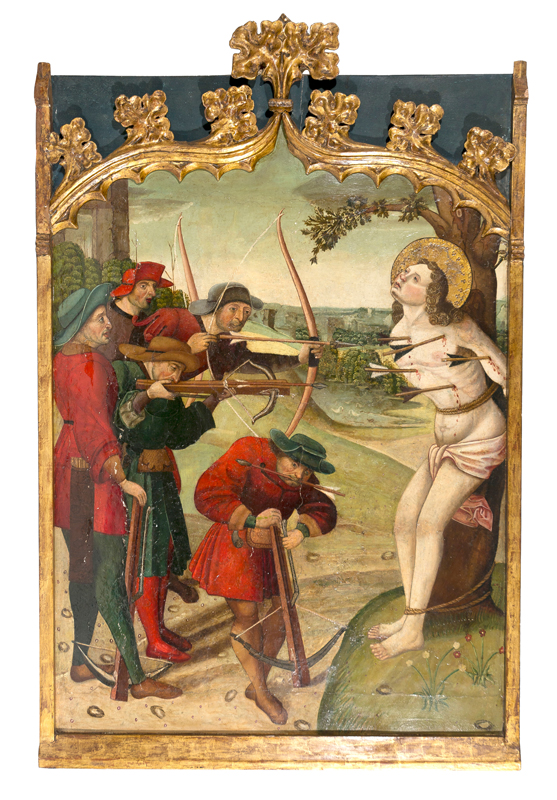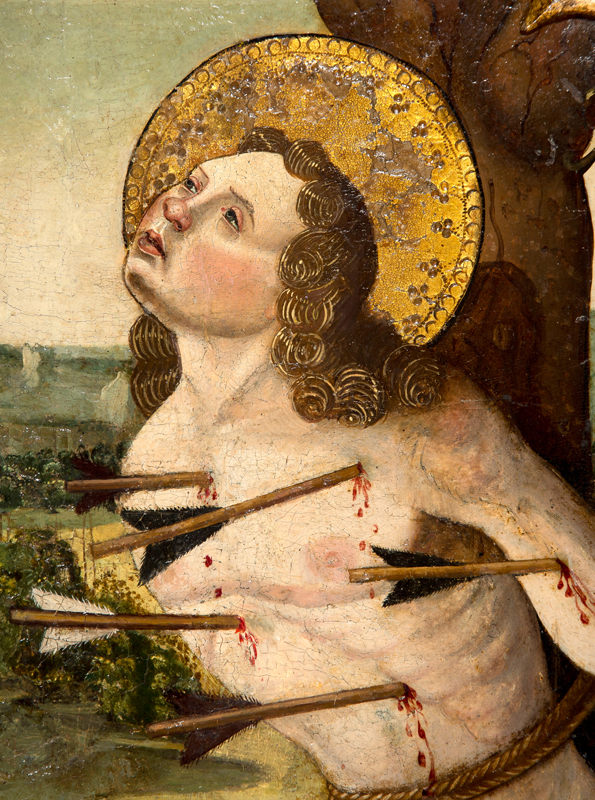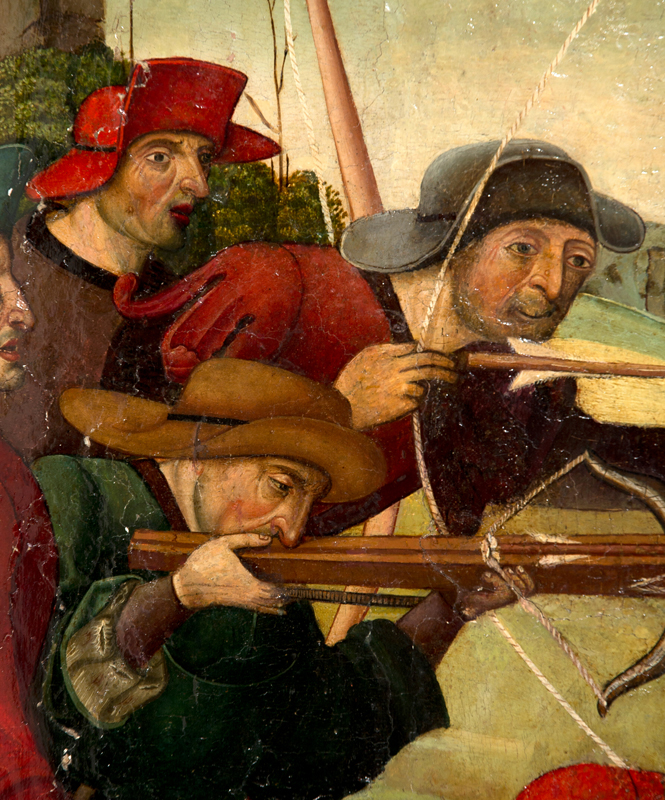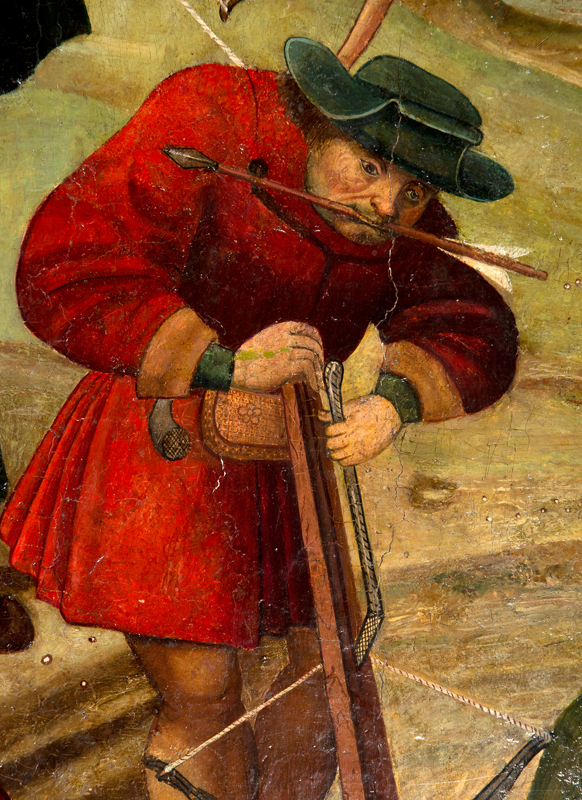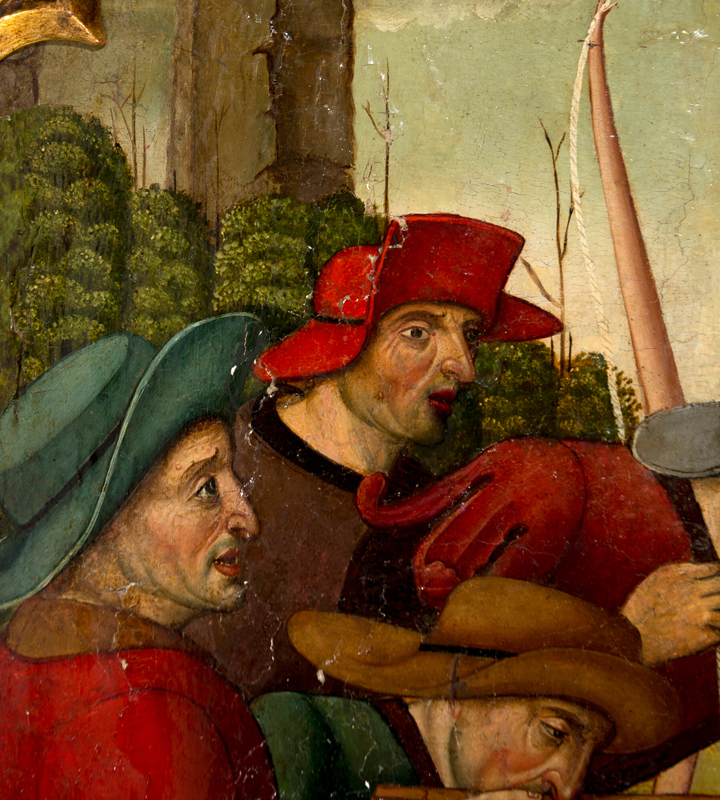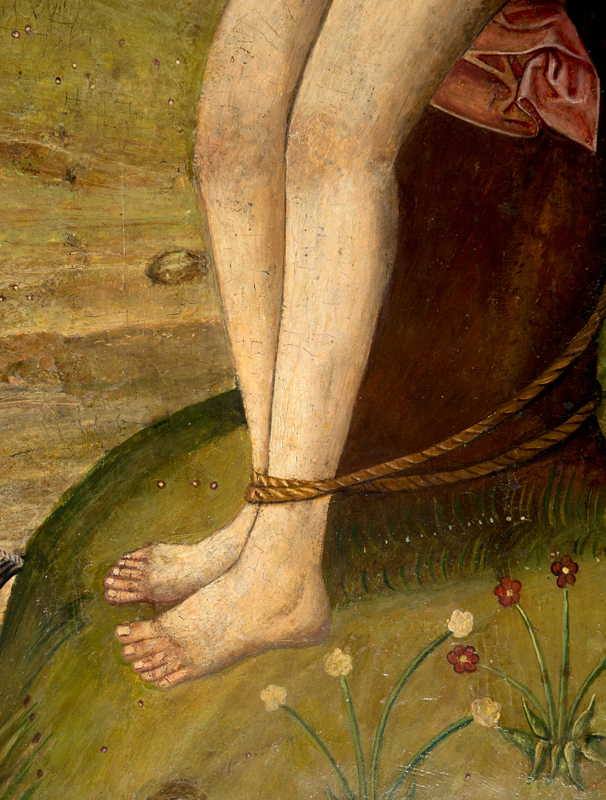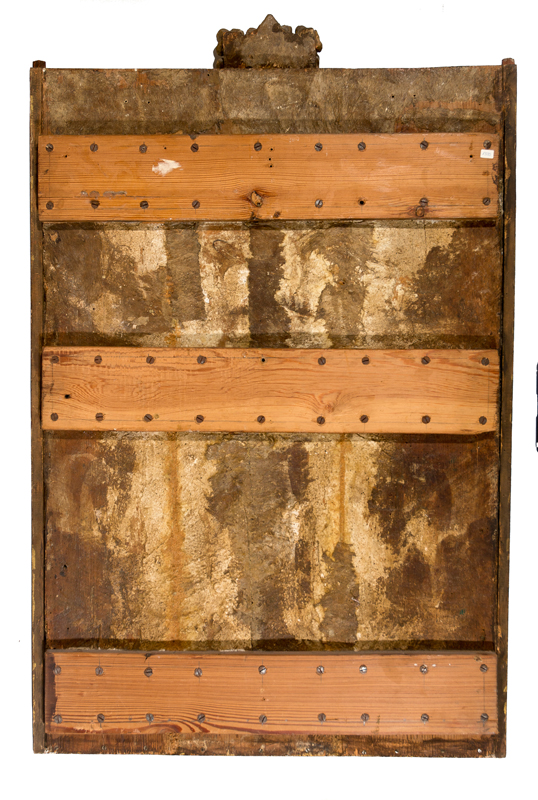20
Master of Santiago. Artist from the circle of the Master of Palanquinos. (León and Astorga, circa
Master of Santiago. Artist from the circle of the Master of Palanquinos. (León and Astorga, circa 1500)
"The Martyrdom of Saint Sebastian"
Tempera and gold on panel. This lot and the following one were part of the same altarpiece. Panel measurements: 89 x 62 cm.
Thanks to the research of Dr. Albert Velasco, it has been possible to ascribe this table and the subsequent one (lot 6) as from the Master of Santiago.
In his thesis “De la pintura Hispano-flamenca al primer Renacimiento en las antiguas diócesis de León y Astorga: El Maestro de Palanquinos y el Maestro de Astorga (c. 1480-1540)” (On Hispanic-Flemish painting of the early Renaissance in the former dioceses of Leon and Astorga: The Master of Palanquinos and the Master of Astorga (c. 1480-1540)), Marc Ballesté, in chapter 2.5, Collaborators and the Maestro de Palanquinos Circle, identifies a series of artists whose paintings were attributed to the Master of Palanquinos until that moment. One of these is the painter known as the Master of Santiago, because of the number of scenes he dedicated to the pilgrim saint. These panels, lots 5 and 6 in our catalogue, unknown until now, have thus been identified by Dr. Albert Velasco as being by the Master of Santiago, and they could in fact have belonged to the same reredos of the life of the saint as those mentioned by Marc Ballesté: “Finally, it is worth mentioning some panels which are all work of the same painter. On describing four of these, kept in Raimundo Ruiz’s collection in Madrid, Post does not only ascribe them to the Master of Palanquinos but also defines them as some of the artist’s greatest achievements. They represent scenes from the life of James the Great (Santiago), specifically the Drowning of the Persecutors of the Saint’s Disciples, the Sermon, the Decapitation, and the Removal of the body of Saint James.
A sign of its relation to these is the human form of the only figure in a frontal position in both panels, which is identical in its features. According to the photo library, the painting The Removal of the body of Saint James, can be found in E. García’s collection in Madrid. According to what can be seen in both images, we are disposed to refute the attribution put forward by Post. As in the paintings studied recently, the Master has something of the style of Palanquinos but does not share various elements with him. He shows, for example, a lack of control over proportions both of human and architectural forms, and introduces flat landscapes without gilded skies, and with scattered trees, definitively more naturalist and closer to the renaissance, which was yet to arrive. The way that he paints the characters’ eyes, with their certain, rounded shape framed by rather arched eyebrows deserves attention. Just like the Master of Valencia de Don Juan, the originality of the gold decoration of the haloes is also outstanding. There are two more panels, one in Dr. Esteve’s collection in Barcelona and the other in the museum at Astorga Cathedral, which are likely to have been painted by the same artist, which according to the number of scenes he dedicated to the pilgrim saint, we can call the Master of Santiago.”
We thank Dr. Alberto Velasco Gonzàlez, for his help in identifying and cataloguing this work.
Bibliography:
Ballesté Escorihuela, Marc: “De la pintura Hispano-flamenca al primer Renacimiento en las antiguas diócesis de León y Astorga: El Maestro de Palanquinos y el Maestro de Astorga (c. 1480-1540)”. Lleida, abril de 2017.
Master of Santiago. Artist from the circle of the Master of Palanquinos. (León and Astorga, circa 1500)
"The Martyrdom of Saint Sebastian"
Tempera and gold on panel. This lot and the following one were part of the same altarpiece. Panel measurements: 89 x 62 cm.
Thanks to the research of Dr. Albert Velasco, it has been possible to ascribe this table and the subsequent one (lot 6) as from the Master of Santiago.
In his thesis “De la pintura Hispano-flamenca al primer Renacimiento en las antiguas diócesis de León y Astorga: El Maestro de Palanquinos y el Maestro de Astorga (c. 1480-1540)” (On Hispanic-Flemish painting of the early Renaissance in the former dioceses of Leon and Astorga: The Master of Palanquinos and the Master of Astorga (c. 1480-1540)), Marc Ballesté, in chapter 2.5, Collaborators and the Maestro de Palanquinos Circle, identifies a series of artists whose paintings were attributed to the Master of Palanquinos until that moment. One of these is the painter known as the Master of Santiago, because of the number of scenes he dedicated to the pilgrim saint. These panels, lots 5 and 6 in our catalogue, unknown until now, have thus been identified by Dr. Albert Velasco as being by the Master of Santiago, and they could in fact have belonged to the same reredos of the life of the saint as those mentioned by Marc Ballesté: “Finally, it is worth mentioning some panels which are all work of the same painter. On describing four of these, kept in Raimundo Ruiz’s collection in Madrid, Post does not only ascribe them to the Master of Palanquinos but also defines them as some of the artist’s greatest achievements. They represent scenes from the life of James the Great (Santiago), specifically the Drowning of the Persecutors of the Saint’s Disciples, the Sermon, the Decapitation, and the Removal of the body of Saint James.
A sign of its relation to these is the human form of the only figure in a frontal position in both panels, which is identical in its features. According to the photo library, the painting The Removal of the body of Saint James, can be found in E. García’s collection in Madrid. According to what can be seen in both images, we are disposed to refute the attribution put forward by Post. As in the paintings studied recently, the Master has something of the style of Palanquinos but does not share various elements with him. He shows, for example, a lack of control over proportions both of human and architectural forms, and introduces flat landscapes without gilded skies, and with scattered trees, definitively more naturalist and closer to the renaissance, which was yet to arrive. The way that he paints the characters’ eyes, with their certain, rounded shape framed by rather arched eyebrows deserves attention. Just like the Master of Valencia de Don Juan, the originality of the gold decoration of the haloes is also outstanding. There are two more panels, one in Dr. Esteve’s collection in Barcelona and the other in the museum at Astorga Cathedral, which are likely to have been painted by the same artist, which according to the number of scenes he dedicated to the pilgrim saint, we can call the Master of Santiago.”
We thank Dr. Alberto Velasco Gonzàlez, for his help in identifying and cataloguing this work.
Bibliography:
Ballesté Escorihuela, Marc: “De la pintura Hispano-flamenca al primer Renacimiento en las antiguas diócesis de León y Astorga: El Maestro de Palanquinos y el Maestro de Astorga (c. 1480-1540)”. Lleida, abril de 2017.
Galleons: The Meeting Between the Old and New World
Sale Date(s)
Venue Address
General delivery information available from the auctioneer
The purchase price includes the delivery of the lots in the venue of the auction. Transporting to other destinations is at the own risk of the client. The customer must contact "LST", to give the corresponding instructions for such transporting. "LST" is not responsible for the packaging or any accident incurred during transportation.
Important Information
Aufgeld/Premium: 22 %, USt auf Aufgeld/VAT on premium: 21 %
Terms & Conditions
CONDITIONS OF THE AUCTION:
I. REGISTRATION. To bid in the room customers must register at the beginning, filling out a form and picking a number that will identify them during the auction. Customers may be required to register in bank references or other guarantee system and if they do not prove the solvency "LST" will not accept bids and award the auction.
II. WRITTEN BIDS. "LST" will accept written bids, which will be formalized in the form provided by the room until the day before the auction. In such auctions, the room will bid in name of the client until the maximum stated in the offer and always at the lowest possible price. If there are two or more bids for the same amount, the one placed first will have the priority. Written bids received in advance, will have priority on the day of the auction.
III. TELEPHONE BIDS. "LST" will allow telephone bids, if interested people contact "LST" days before the auction providing personal data, ID card and the phone number which will be used by the staff of "LST" to call at the time of the auction. The buyer, within all the legal rights is making an offer for the asking price, when applies for telephone bid. "LST" will not take responsibility for any technical defects beyond its control, which may prevent to contact successfully the bidder during the auction.
IV. AUCTIONEER. The auction will be conducted by an auctioneer, director of the auction will be judge and arbitrator of it with full authority in its development, will award the lots to the highest bidder and is able to settle any controversy concerning lots sale, reject bids, divide lots or group them and remover objects from the room. Will be able to, if it is deemed suitable, not accept bids on the auction. His decision will be unappealable.
V. SALE OF LOTS. The lots are awarded to the highest bidder. Once the auctioneer blows the hammer, the buyer becomes responsible of the lot purchased, exempting "LST" of liability to for any damage and / or accidents that may occur. No refunds of lots.
VI. STARTING PRICE. The amount shown in the catalogue as the starting price for each lot will be, as a rule, the minimum selling price, except for exceptional cases where a reservation may be agreed upon with the seller or it set discretionary by the room.
VII. SCALE OF BIDS. The bids are set according to the following scale:
From 50.-€ to 200.-€…………………………………………..at 10.-€
From 200.-€ to 500.-€…………………………………… …25 in 25.-€
From 500.-€ to 1.000.-€………………………………..…..….50 in 50.-€
From 1.000.-€ to 2.000.-€………………………………..…100 in 100.-€
From 2.000.-€ to 5.000.-€……………………………….….250 in 250.-€
From 5.000.-€ to 10.000.-€…………………………………500 in 500.-€
From 10.000.-€ to 20.000.-€……………………………1.000 in 1.000.-€
From 20.000.-€ to 50.000.-€……………………………2.500 in 2.500.-€
From 50.000.-€ to 100.000.-€…………………………..5.000 in 5.000.-€
From 100.000.-€ to 100.000.-€………………………10.000 in 10.000.-€
From 200.000.-€ to 200.000.-€………………………25.000 in 25.000.-€
From 500.000.-€ to 500.000.-€………………………50.000 in 50.000.-€
VIII. RIGHT OF ADMISION. "LST" reserves the right to admission to the auction room and to reject, at its judgment, any purchase order, from clients whose solvency is not duly proved as well as not to sale auctions.
IX. SALE PRICES. The successful bidder of one or more lots must pay "LST" the final sale price achieves at auction, plus the 22 % plus 21% VAT on the commission, at total 26,62 % on Hammer Price.
X. CATALOG DATA. The catalogue data are obtained in order to careful research and advice, however, any responsibility is afforded about its accuracy. The lots will be auctioned in the state in which they are, not accepting any claims in restorations, breakage, damage, imperfections and, even description or numbering mistakes in the catalogue, in case of it, being the burden of the buyers to make sure before the auction that the description matches with their personal opinion about respective lot. The exhibition of the lots is intended to allow a perfect review and study of them.
XI. PAYMENT AND REMOVAL OF LOTS. Payment and removal of the lots will be held no later than five days following the auction. After this period expire without having the buyer removed the lot or lots purchases, it will accrue an expense of custody of 6 euros per day on each lot.
15 days after the auction without having the buyer paid and removes the sold lots, "LST" will inform the seller and there will begin judicial proceeding in order to obtain payment. The delay in payment by the purchaser of his/her sold lots will carry an interest increase at a rate of 1,5% per month.
XII. DELIVERY OF LOTS. The purchase price includes the delivery of the lots in the venue of the auction. Transporting to other destinations is at the own risk of the client. The customer must contact "LST", to give the corresponding instructions for such transporting. "LST" is not responsible for the packaging or any accident incurred during transportation.
XIII. RIGHT OF FIRT REFUSAL AND REPURCHASE. "LST" in order to article 38 of "Ley 16/1985 de 25 Junio del Patrimonio Histórico Español" (BOE. 155 June 29, 1985), will notify in advance to the Ministry of Culture, the content of their catalogues. Concerning the lots subject to the legislation referred to in the preceding paragraph, the Administration may exercise the rights of first refusal and repurchase according to the law. "LST" will watch over the protection of Artistic, Historical and Bibliographical Heritage of Spain. For customers out of European Community, a tax for export is required by the Administration.
XIV. VALUE ADDED TAX (I.V.A). This tax will be accrued on commissions of "LST" for buyers, using the rates prevailing on the date of the auction.
XV. DATA PROTECTION. In order to the "Ley 15/1999 de 13 de Diciembre, de Protección de Datos de Carácter Personal", the client authorize "LST", the inclusion of their data in a customer file, and for the promotion by "LST" of the objects at all times the rights of access, rectification or deletion of personal data by sending the appropriate request to the following address: LA SUITE SUBASTAS, C/ Conde Salvatierra, 8, 08006. Barcelona.
XVI. EXPRESS LEGAL JURISDICTION. These Conditions are governed by and interpreted in accordance with the rules of Spanish law. The mere act of participating in the auction as seller, buyer or bidder, implies acceptance of these Terms and Conditions.
Sales operations are understood to be held at the registered office of "LST", C/ Conde de Salvatierra, 8, 08006. Any dispute shall be taken to the competent courts of Barcelona, expressly waiving any other jurisdiction, in accordance with Article 55 of the "Ley de Enjuiciamiento Civil".















